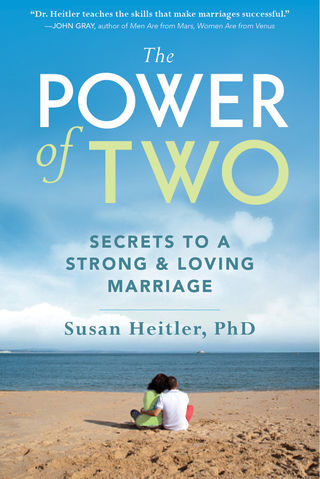Marriage
Need Help Coping With a Tough Marriage? A Painful Divorce?
Marriage, and also divorce, can be hard—yet both can be made less upsetting.
Posted February 27, 2017

My client Stephanie (name changed for confidentiality) called my office for an emergency appointment. "I can't take it any more," my client Stephanie told my office manager. "I had such a tough marriage. Now do I have to suffer a painful divorce?"
Fortunately for Stephanie, two discoveries alleviated her anxiety and depression.
What had felt so crushing as she was going through first her marriage, and then her divorce?
I asked Stephanie to give me examples of what John, her soon-to-be-ex, did that felt so crushing to her.
"When I went to the house to start collecting my personal things I asked John where my jewelry was. I usually keep it in my top drawer and it wasn't there. He didn't answer. He just shrugged his shoulders, like 'how should I know...'"
I was a bit confused so I asked Stephanie, "And what was your thought in response?"
"I felt like he was punishing me. That's what he has done all through our marriage. He's always punishing me," Stephanie answered in a tone of major distress.
That answer gave me a clue. I asked for a second example to test my hypothesis.
"The same thing happened," Stephanie responded, "when I asked where he put the album my Mom had given me of my baby pictures. 'How should I know?' John answered me, sounding irritated."
And what did you think and feel that time?
"He always makes me feel insufficient, like there's something I did wrong," Stephanie complained, "so I reacted just like I usually do. I felt crushed. I felt so stomped on that I went to bed as soon as I got back to my new apartment. I was so anxious and so depressed I couldn't get out of bed the rest of the day."
What had caused first the marriage and now the divorce process to feel so painful for Stephanie?
Marriage is challenging. Going through a divorce also is challenging for almost everyone who ends a marriage, often because whatever went wrong in the marriage probably will go wrong in the divorce as well.
Marriage takes both maturity and skills from both partners, plus good matching. Partner choice does matter. At the same time, so does ability to handle partnership effectively.
Cutting off an arm or leg would hurt, and would take major adjustments in all areas of your life. Severing a major relationship like a marriage partnership can feel equally painful, albeit emotionally rather than physically painful. It also takes major readjustments in all you do, and along the way is bound to evoke episodic waves of anxiety, sadness, and anger.
At the same time, specific habits that may have built up during a difficult marriage can make getting through a divorce even more overwhelming, anxiety-producing, and depressing.
What makes coping with a difficult marriage and also getting through a divorce more painful?
Many factors matter, for example,
- how much support you have from other family members
- what positive activities you have going in your life to keep you from being hyper-focused on the divorce
- how cooperative versus adversarial you and your ex are able to be as you work your way through the separation process
- if either of you tends to be selfish or mean
- or if you tend to be an emotional hot reactor
At the same time, the factors that overwhelmed Stephanie's ability to cope with either her marriage or her divorce were two that I see frequently in my clinical practice: Interpreting through an earlier template is one. Personalizing is the second.
An earlier template refers to hearing someone in your current life as if that person was someone you had suffered from earlier in your life.
Personalizing involves reacting to what someone does by taking it personally, as if it is a negative message about or to you. While that interpretation may have a grain of truth, it often misses on the larger realities
Stephanie took her soon-to-be-ex's husband John's uncooperative behavior as signs that she was being punished. In Stephanies's first example, the 8-year-old part of her took over so that she reacted to John in the same as when her harshly punitive father used to punish her. The reaction to John was based on the template she had formed in the earlier-in-life interactions with her father. She also personalized John's irritation, hearing it as a sign that John was punishing her, In fact, she was missing altogether the reality that John's irritation in fact stemmed from profound sadness that his wife had decided to leave him.
In the second example, Stephanie interpreted John's irritated voice as a sign that in his eyes she was insufficient. In this case, Stephanie was interpreting John's irritability as if it was the frequently irritated voice of her older brother as they were growing up. Her brother's stance toward her had often included "See how much bigger and better I am than you are." In reality, John actually felt defensive, believing as he often had in the marriage that he couldn't do anything "right," anything that would please Stephanie.
Note Stephanie's phrase "made me feel."
That phrase "made me feel" often signals that:
a) someone is probably interpreting what they hear through the template of what that message would have conveyed in an earlier relationship
b) the interpretation has an element of personalizing, that is of taking the comment personally.
What can you do to counter these unfortunate and upsetting habits?
In general, consider your partner's upsetting words or actions as messages about him/her, not about you.
John spoke with irritation because he was feeling overwhelmed, hurt and sad. His "How should I know?" responses actually reflected feeling genuinely clueless.
In fact, his response illustrated how the divorce process often raises the same troubling emotions that characterized how a person felt in the marriage.
John in fact generally had zero idea of how or why his wife wanted things from him. Making matters worse, instead of asking her for more information when she made requests to him, he would respond by feeling anxious. He then quickly flipped from anxiety into anger, lest he look and sound as helpless as he felt.
Next time you feel a sense of suffering in your marriage—or in a process of divorce—instead of interpreting, ask. The more you understand about what and how your partner is feeling and where that feeling comes from with regard to earlier life templates, the less likely you will be to assume that a) your partner treats you just like someone earlier in your life did and b) your partner is intentionally treating you poorly.
What is an ideal reaction for coping with a tough marriage or a painful divorce?
If you find yourself getting depressed, angry or anxious, regard your partner realistically, looking to experience him with empathy instead of through old templates or with personalizing. Think about how you might understand what your partner does in terms of his/her earlier life experiences. Consider his/her personal limitations. With empathy for others comes inner strength within yourself. Go for it!
(c) Susan Heitler, PhD
--------------

Dr. Heitler's Power of Two book, workbook, and fun interactive online program teach the skills for enjoying a loving marriage, including skills for talking cooperatively about sensitive subjects.




